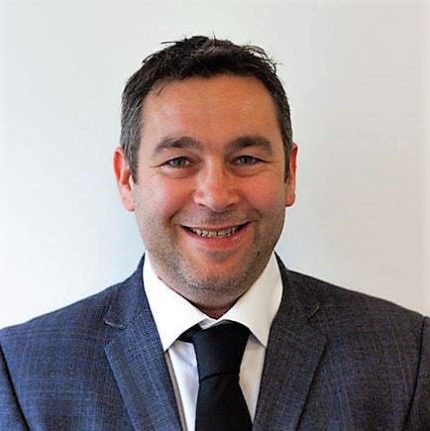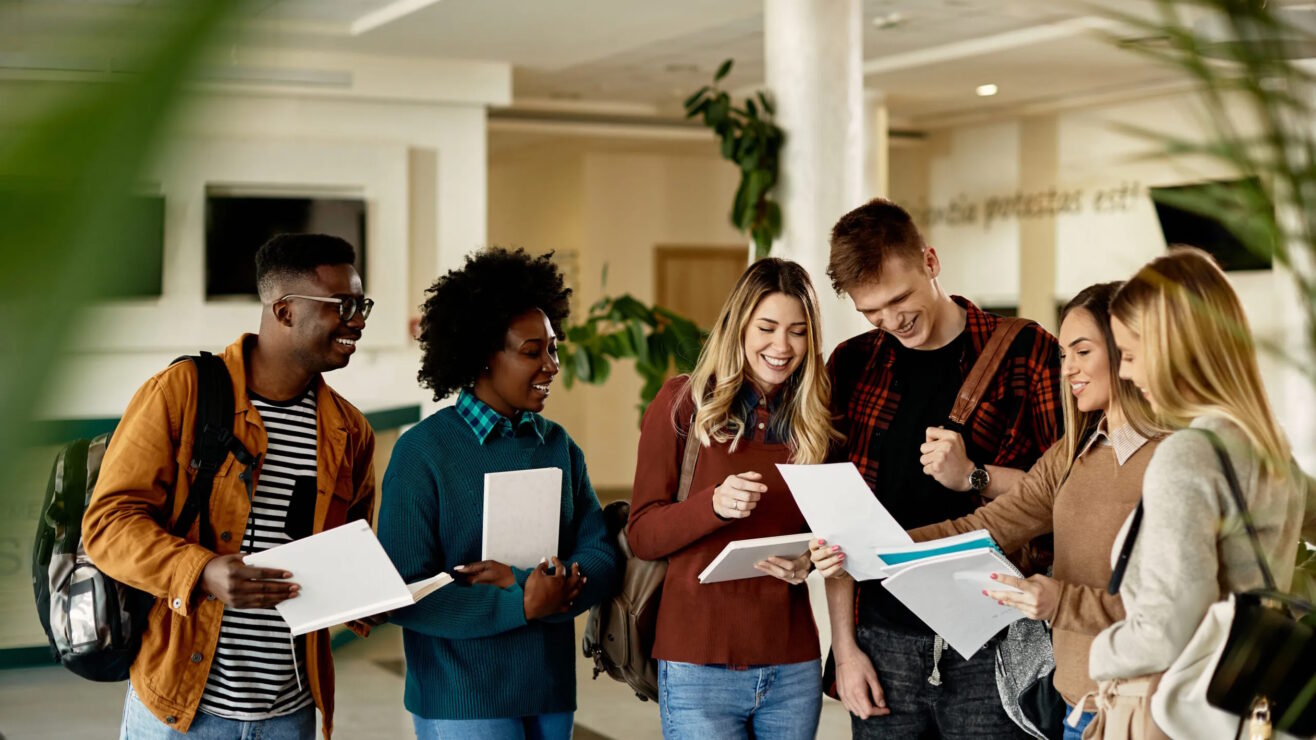It’s mid April – and a group of around 40 elected officers and senior staff from around 20 students’ unions have congregated in Manchester.
Just for the day, we’ve paused work on induction programmes and newly elected officer training programmes to jump off the treadmill that is the academic year, and consider what an innovative strategy might look like for 2030, if only we let ourselves think outside the box.
This time there was no old strategy to build on, no chance to ask neighbouring SUs what their plans looked like, just a totally new set of rules.
Like Fibchester, but not like Fibchester
The mission was essentially completing a strategic planning exercise but without the usual membership consultation surveys, segmentation exercises and an analysis of existing data to lead the session.
Instead, we had a simulation-based activity, where each group was given an imaginary university and SU, each with their own individual institutional contexts to deal with. From there, we were challenged to think about what we know about the current ever-changing climate and imagine how that may impact what we do in SUs.
We were set tasks to reflect on what policies might emerge from a new government. These ranged from changes to university funding arrangements could impact the SU, how SUs could utilise a renewed civic agenda, how new access and participation targets could create opportunities, how the demise of old school democratic models like elections and referenda might be replaced and, obviously, how rapidly changing technology might revolutionise students’ learning.
In this way we examined what a students’ unions’ role and function might be in 2030, while reflecting on what we believe their core purpose to be.
For those of us who had forgotten, or were not around thirty years ago, the day opened with a brief background to some of the key strategic periods in students’ unions’ recent history from the focus on pubs and clubs in the 80s as licensing laws opened up and the emphasis on personal development in the 90s as a way of spending SUs new additional income.
Then to the growth in investment into representation and campaigning as a “core business” in the 00s and a new emphasis on diversity and inclusion as SUs respond to hyper-diverse student bodies and the current generations’ advocacy for equitable campuses.
Mission:possible
The exercise we were undertaking was designed to elicit a hint of chaos that might identify the next strategic shift for students’ unions. We wanted to explore the new paradigm – the HE funding challenge, the dependency on student volunteering in our representation, activities, events etc, the campus relations increasingly showing signs of tension anxiety and competition, the opportunity to do more around place based strategy and the impact of marketisation.
It wasn’t so much new rules as no rules!
Our group, given a brief for fictitious Midland Met University Students’ Union and a range of contextual provocations, set about thinking about the key and pertinent issues affecting students now and facing them over the next 10 years in order to try to focus our students’ union strategic mission.
The increasing diversity of student bodies was a great opportunity but posed risks in a world of considerable tribalism, culture wars and competing needs or expectations. The pandemic had accelerated a range of mental health challenges with young people increasingly showing signs of social anxiety, depression and other mental health vulnerabilities which we feared might get worse given the continued reduction in availability of public health services offering mental health support.
We wondered whether the romantic idealism of meeting your future partner at the SU ball, the lifelong friendship found in a shared love of Taylor Swift at the Swift Society, the indelible photo in your mind of lifting the trophy with team at the varsity and the best friend for life who you campaigned with on climate change was from a fading era or whether we should strengthen the role of the students’ union in creating an environment where passions, friendships, companionship etc would be created.
Maybe, we thought, that the strong interpersonal skills that bind together the Bullingdon Club should perhaps not be the sole domain of Oxbridge students but harnessed by students’ unions?
We talked about how students and universities are struggling with town and gown and how institutions and students should avoid allowing students to become enclosed in HE bubbles that operate in isolation of their wider communities – encouraged to explore the wider city and region, for their dram society to partner with the local am-dram group and the netball team to offer coaching at the local school to enhance community relations for all.
We talked about how Brexit risked reducing the international connection of UK based students and how we might encourage learning new languages, volunteering abroad, celebrating multiculturalism etc in order to protect and preserve, even grow students’ sense of relationship within a global context.
Relationships, relationships, relationships
All of this was about relationships – about helping students develop the skills and outlook that would enable them to build relationships that supported their health and wellbeing, open up new opportunities, enhance their sense of place within the wider environment, ensure their relationship with learning was as a partner and that their sense of broader citizenship and being part of something bigger was part of their university experience.
In our quick mission statement we paired this with key ideas around empowerment and social change.
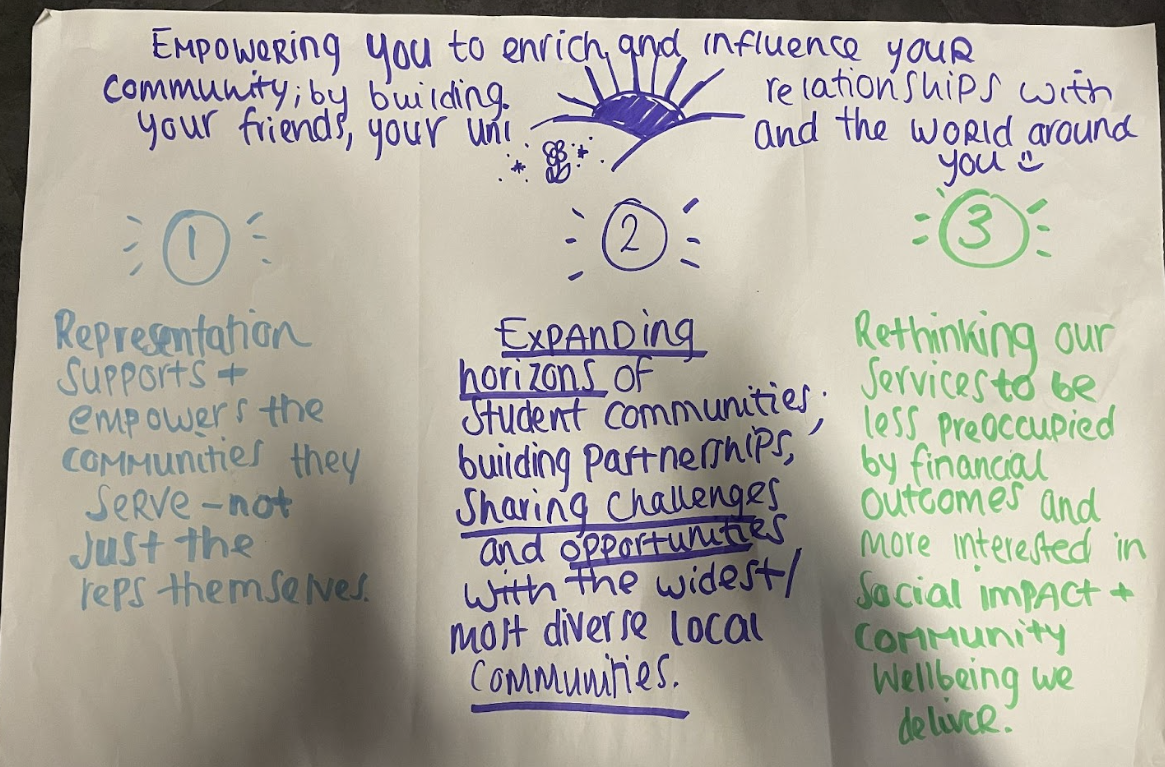
Empowering you to enrich and influence your community by building relationships with your friends, your uni and the world around you.’
The team then spent some time identifying their strategic development priorities that might use this mission.
Rethinking representation
We felt strongly that representation should remain as core business in a strategic context where students continued to face injustice and inequity and where representation and campaigning is a key vehicle for influencing outside of the union.
But we also felt that too often though we focus on the representative and not enough on the representation. We thought that we might need to stop measuring the success of representation by the number of votes in an election and instead on the outcomes secured by representation.
We wanted to focus on representatives that build relationships (and subsequently influence) with both students and critical decision makers rather than operate in isolation of the communities they serve.
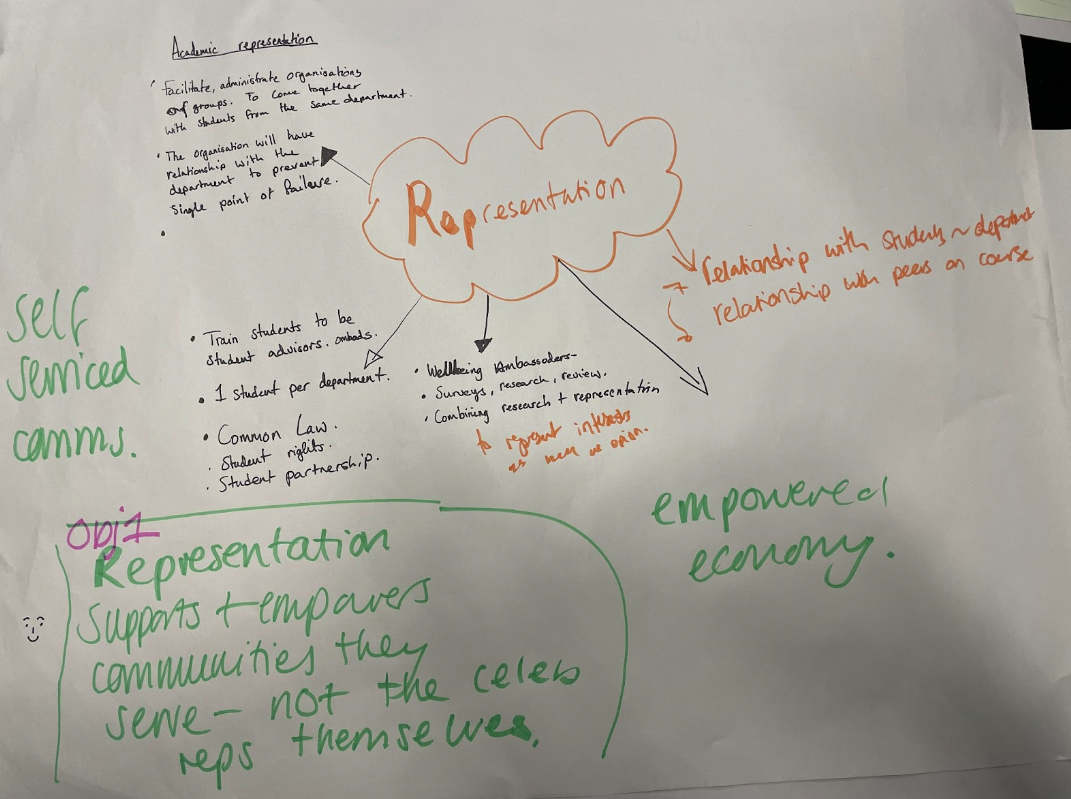
Representation supports and empowers the communities they serve – not just the representatives themselves’
Student communities
We believed that relationships might allow us to strengthen the student community in and of itself but also to create better bonds and pathways between campus and wider communities. We wanted to turn the union building into a community asset that would perhaps become part of the wider social infrastructure of the cities and regions in which they exist.
We wanted to establish citizens assemblies making students agents for change in their wider communities building good quality housing not just for students but for all, ensuring public transport was affordable not just to get you to your lecture but equally to get the elderly to their medical appointment, the job seeker to their job interview and the child to school.
This shifting sense of community would be linked back to academic study in many instances and the group were keen to explore more course based freshers to ensure a link between your course, your uni, your city.
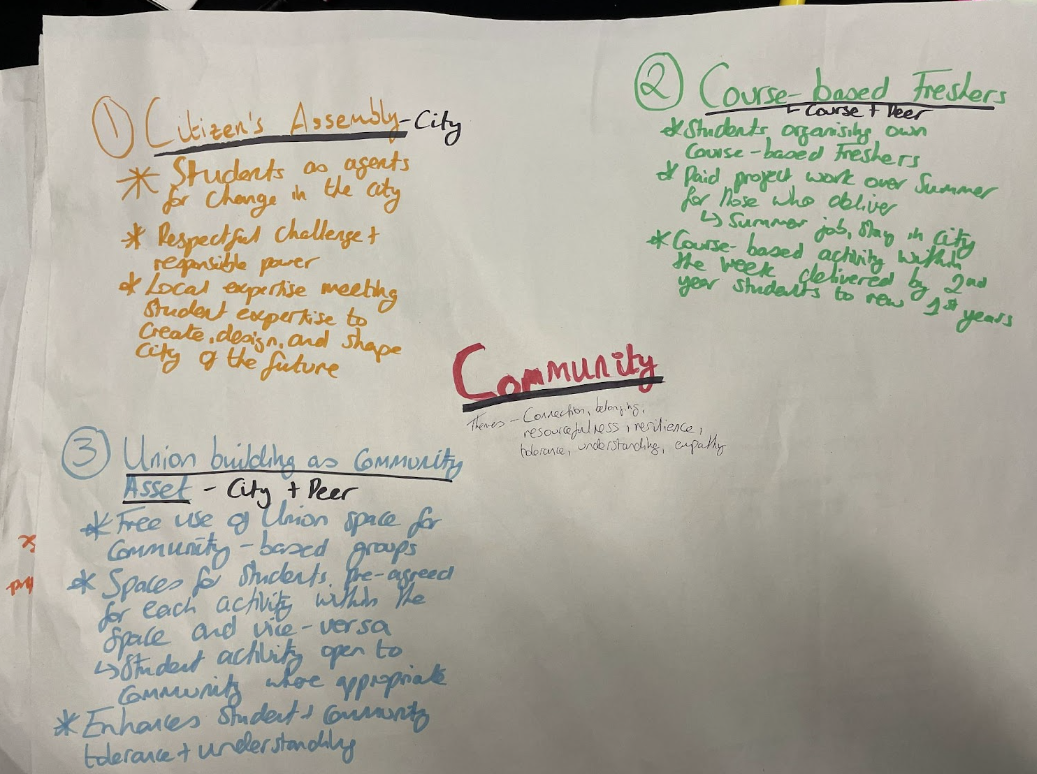
Expanding horizons of student communities; building partnerships, sharing challenges and opportunities with the widest & most diverse local communities.’
An economy fuelled by people and relationships rather than pounds and pence
This strategic development theme came from the premise that the business case for our union should be steered not only by a sustainable economy but on how it influences and supports student relationships.
If our services become social enterprises, driving good health, creating friendships, strengthening connections between students and the city, delivering greater accessibility for the full diversity of our community then we might be better equipped to differentiate ourselves from the competition.
We know that Wetherspoons can make more money than us. We know that the internet will offer information and advice in abundance. We know that students can get many jobs elsewhere. But those organisations aren’t creating relationships in the same way our union will.
Key here was an ambition to create more and create better jobs for students – as students. Jobs that encourage the student filling the role to celebrate their connection to the student community, to use their academic development alongside their professional development and in doing so allow us to employ students in jobs with greater decision making authority and specialism. They won’t just serve the coffee as a barista but as someone who’s actively empowered in understanding pricing strategy, reducing food waste, considering how to diversify the menu and ensure optimum accessibility to the space.
Secondly, to rethink traditional economic models and ask difficult questions about how our services maximise the social impact. If we shut the night club and transformed it into a series of affordable student rentals would that have a greater impact (social or economic) than a half empty SU club night every Wednesday during term time? If the summer ball only had student acts and no 20k pop headliner and a giant entourage would the event have a better impact?
Finally, we want our economy to serve a wider community interest. Not only would students benefit from sharing their coffee lounge with local independent businesses, with wider community groups and having their off campus neighbours perform with the student societies, it’s also good from a commercial point of view.
Effectively this objective increases your market – drives greater footfall and it dramatically influences the relationships our students have with the world around them.
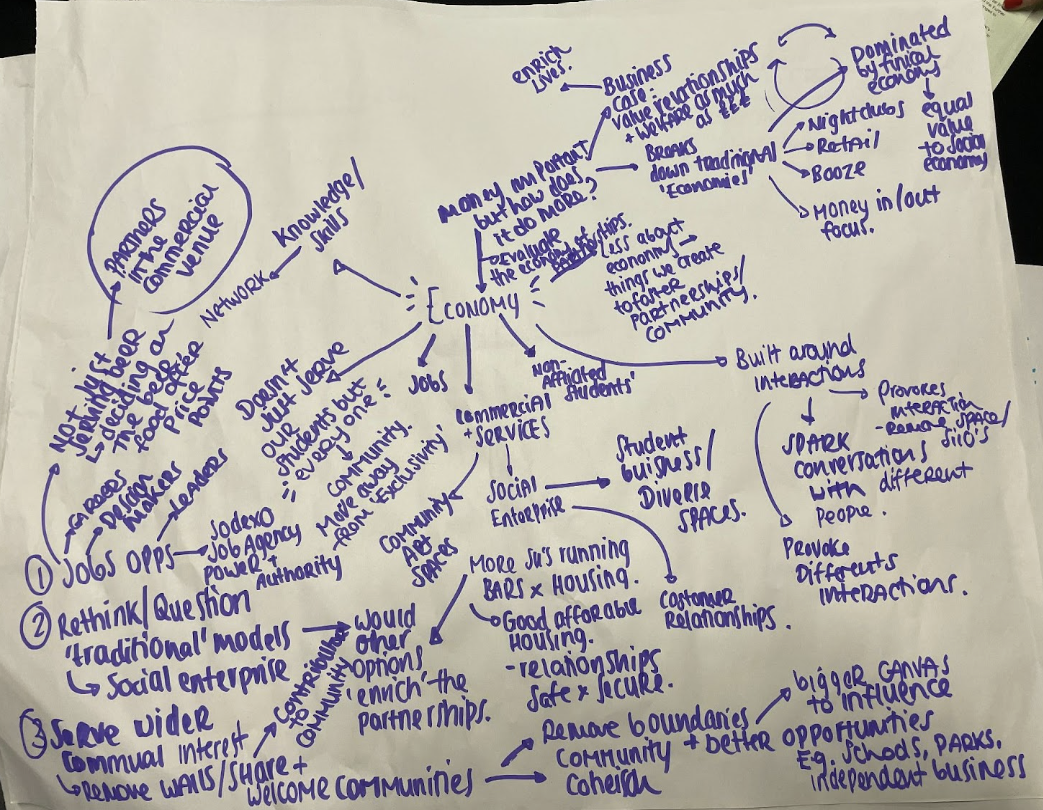
Rethinking our services to be less preoccupied by financial outcomes and more interested in social impact and the community and wellbeing we create.’
New rules, new strategy
We make no pretence that in a few hours we had solved the key strategic dilemmas or found the perfect sweet spot for students’ unions. We don’t pretend our ideas were fuelled by membership data and collaborative design techniques. And we know that our “soundbites” and headlines lack traditional KPI’s, operating plans, time lines and frankly – detail.
We don’t claim that what we thought might fit Midland Met University SU would work equally in every institutional context.
Ironically though, we don’t really think our ideas are radically new – they still leave huge space for unions to enjoy their existing approach to student activities, representation, services and events.
What they do show is by bringing people together to explore context creatively we are able to come up with a new mission and purpose that we think is really relevant both to today and our horizon.
If we can become specialists in supporting students to build relationships, in thinking about how our representation, communities and economy stimulate students to have positive, aspirational, diverse and civic relationships, that change their sense of confidence and outlook and place, students’ unions could have a very exciting future.
Ben Vulliamy and Tammika Chambers were joined by Jo Gregory-Brough, Director of Communications and Student Insights at Loughborough SU, Will Fuller, CEO at Cardiff Met SU, Lauren Friel, President at Chester SU, Andy Squire, CEO at Solent SU and Joe McGarry, President at Durham SU.

